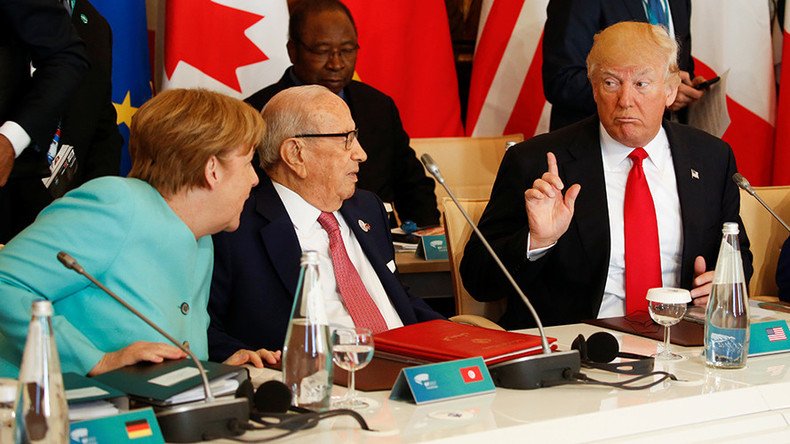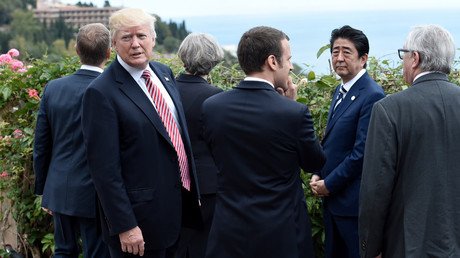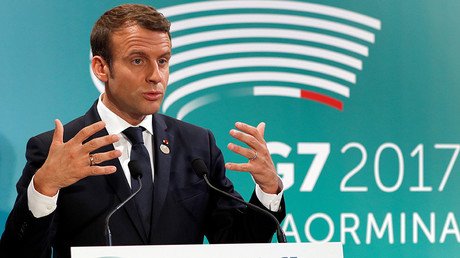G7 split on climate change, Merkel ‘dissatisfied’

This week’s G7 summit was supposed to focus on security and immigration, but climate change took the spotlight, leaving member states divided. The German chancellor called talks with sceptic Donald Trump ‘very difficult’ and ‘very dissatisfying.’
For the site of the G7 summit, this year's host country Italy chose Sicily, which suffers from an inflow of refugees from Libya, to stress the toll the migration problem has taken on the country. But the summit, which wrapped up on Saturday, instead exposed serious divides between the United States and the rest of the group on climate change. US President Donald Trump refused to endorse the 2015 Paris agreement, while promising to make the official decision “next week.”
I will make my final decision on the Paris Accord next week!
— Donald J. Trump (@realDonaldTrump) May 27, 2017
During his presidential campaign, Donald Trump repeatedly denied the existence of the climate change issue, calling it a “hoax” created by the Chinese. The disagreement was so apparent that it made its way into the summit’s final communique.
“The United States of America is in the process of reviewing its policies on climate change and on the Paris Agreement and thus is not in a position to join the consensus on these topics,” the document reads.
German Chancellor Angela Merkel seemed to be dissatisfied the most with Trump’s stance on the issue.
“The entire discussion about climate was very difficult, if not to say very dissatisfying,” Merkel told reporters. “There are no indications whether the United States will stay in the Paris Agreement or not.”
At the group’s summit in 2007, Merkel urged then-US President George W. Bush to seek substantial cuts in greenhouse gas emissions.
US Defense Minister Jim Mattis told CBC News that Trump was “wide open” on the Paris Agreement during the G7 meeting.
“We’ve obviously got a discussion going on about our policy in this regard,” Mattis said. “I was sitting in on some of the discussions in Brussels, by the way, where climate change came up, and the president was open. He was curious about why others were in the position they were in – his counterparts in other nations – and I’m quite certain the president is wide open on this issue as he takes in the pros and cons of that accord.”
According to insiders cited by Axios news outlet, Trump plans to back out of the landmark climate change deal altogether.
G7 agree to battle “protectionism” amid Trump’s ‘very bad Germans’ remarks
The G7 countries did seem to overcome their divisions on global trade issues. Despite fears to the contrary, Trump agreed to wording that pledges to fight protectionist “trade-distorting practices” like price dumping or subsidies.
“We reiterate our commitment to keep our markets open and to fight protectionism, while standing firm against all unfair trade practices,” the communique reads.
...."we push for the removal of all trade-distorting practices....to foster a truly level playing field."
— Donald J. Trump (@realDonaldTrump) May 27, 2017
President Trump’s campaign was based on the ‘America First’ principle, and he repeatedly threatened to impose higher tariffs on imports from China and Mexico and renegotiate NAFTA, a free trade deal with Mexico and Canada, to his liking. He also fueled concerns over his protectionist stance earlier this week by criticizing the state of US trade with Germany.
“The Germans are bad, very bad,” Trump said on Thursday, while meeting European leaders in Brussels, according to a Der Spiegel report. “See the millions of cars they are selling to the US. Terrible. We will stop this.”
The pledge to fight protectionism was a usual part of earlier G7 statements, but it was omitted after a meeting of the group’s finance ministers earlier this month in Bari, Italy. Trump’s treasury secretary, Steven Mnuchin, earlier said that the US reserves the right to be protectionist if trade arrangements are “unfair” to American workers and companies.
China rebuke, Russia threat
Dissatisfaction with the G7 summit was expressed by one outsider as well. China blasted the final statement for mentioning the South China Sea and East China Sea, and calling for the demilitarization of disputed “features.” Beijing has a number of territorial claims in the region in conflict with those of other nations, and has strengthened its position by building up its Navy and reclaiming artificial islands.
Chinese Foreign Ministry spokesman Lu Kang said China was “strongly dissatisfied” with the statement and advised G7 nations to stop making irresponsible remarks.
The G7 nations also threatened to slap more sanctions on Russia over the crisis in Ukraine.
“Sanctions can be rolled back when Russia meets its commitments. However, we also stand ready to take further restrictive measures in order to increase costs on Russia should its actions so require,” the final statement says.
Western nations blame Russia for Kiev’s three-year-long armed conflict with the eastern parts of Ukraine, and have linked the lifting of sanctions with the implementation of the so-called Minsk Agreement, a road-map for ending the violence and addressing the rebels’ grievances. Moscow rejects the link, saying it cannot be held responsible for Kiev’s failure to follow its part of the plan.
Despite maintaining the sanctions, G7 leaders expressed willingness to cooperate with Russia in the fight against international terrorism and defusing the Syrian crisis.














